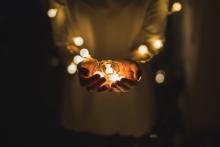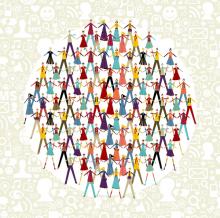separation

The Centers for Disease Control and Prevention recommend celebrating the holidays only with the people you live with. In this recommendation, I hear a resigned invitation to make it work with what we have. Let us draw lessons from those who have long had to make it work. And in that, I offer a prayer.

Earlier this week, author and former pastor Joshua Harris — whose bestselling book I Kissed Dating Goodbye became go-to courtship advice for a generation of teens raised within 1990s-early 2000s evangelical purity culture — announced via Instagram that he and his wife were separating. In the post, he says, “In recent years, some significant changes have taken place in both of us. It is with sincere love for one another and understanding of our unique story as a couple that we are moving forward with this decision. We hope to create a generous and supportive future for each other and for our three amazing children in the years ahead."

1989 was a big year for me, and for the wider world. It was the year I left my teenage years behind. It was also the year that the brutality of government repression in Tiananmen Square rocked the world, U2 came to my home town and rocked the tennis stadium for seven nights straight, and my football team went back-to-back.
But the biggest news by far that year happened in November when the Berlin Wall came tumbling down literally overnight. For 28 years the wall had separated Berliners from each other, dividing not just a nation but whole systems of government — as well as families, traumatizing them in the process.
This is all very personal for me; I have German parents who grew up during a world war that saw their country devastated both from within and without.
Today marks the 25th anniversary of that most wonderful night when people who had been divided for decades were suddenly reunited, and thousands danced on the symbolic grave of separation, celebrating the death of division. For millions of Germans, it is no doubt one of the enduring memories of their lives. For them, Nov. 9, 1989 will never be forgotten.
I can still recall watching it on TV at my mother’s home. As I was watching, I looked over at Mum and saw tears streaming down her face, unable to believe the enormity of what was happening before her eyes. Talking to my dad later, he said he thought it would never happen in his lifetime.

In the northern Pacific Ocean, there is a giant whale named 52 Hertz. Scientists named him that because when he sings, the frequency of his whale song is around 52 Hertz. When other whales sing their songs, they sing at frequencies between 15 and 25 Hertz. His song cannot be heard by any other whale. He is known as the loneliest whale in the world.
Normally whales are communal creatures. They live their lives in family groups. They migrate from warm waters to cooler waters to give birth and find food. They follow the same migration route from year to year. 52 Hertz is different. He lives alone. He does not follow a migration route. He wanders the ocean, a lonely, wandering whale.
We do not know what kind of whale 52 Hertz is. He could be a deformed blue or fin whale. He could be a cross breed of those two types of whales. He could be a kind of whale we have yet to discover. He is an unknown whale.
Soon a team will set out on a seven-week expedition in search of 52 Hertz. Will they find him? Will he find them? Does he want to be found? I wonder.

I GREW UP IN THE BAPTIST CHURCH, memorizing scripture as part of our “sword drills” and arming myself with the necessary tools to convert my friends to the side of righteousness. I was taught that the Earth was 5,000 years old, that scientists fabricated the fossil record to fit their agenda, and that some people—really, most people—were going to hell.
I remember waking up, shaking in my bed from dreams of the hungry flames of hell licking at my heels. My daily decisions were increasingly governed by fear and guilt rather than by love or a sense of what was right.
Where do our contemporary ideas about hell come from? First, we have to consider what it is we’re talking about when we say “hell.” Is it effectively the same as the annihilation of the soul, when one ceases to exist, even in the spiritual sense? Is it less physical and more of a conscious torment, where we, bound by our sins, spend eternity aware only of our irreconcilable separation from God?
Blue Like Jazz author Donald Miller says, “If the religious fundamentalists are right, heaven will be hell. And almost nobody will be there.” Rob Bell, best known for his bestselling book Love Wins, stirred up a tidal wave of controversy not so much for suggesting there wasn’t a hell, but for suggesting a loving God would ensure that such a place would sit empty.
IN THE OLD TESTAMENT, the word “hell” appears 31 times. The phrase “the grave” is used 31 times, and “the pit” comes in at a distant third with three appearances. But all 65 instances of these words throughout the first 39 books of the Bible come from the same Hebrew word, Sheol.
In the Jewish tradition, Sheol is a resting place for the dead. While some believe this is the same as hell, there are indications to the contrary. In the ancient Jewish tradition, Sheol is a place of rest for both righteous and wicked, with no distinction.

When Frederick Douglas assembled with other representatives at the National Colored Convention of 1853, they collectively condemned the nationwide epidemic of racial discrimination. As the gathering intended to discuss the circumstances and possibilities of “coloreds” (as they were called then), they recognized the various ways that “scorn and contempt” were heaped upon them — for no justifiable reason — by the white-skinned racial majority.
In remembrance of Douglas’ critique surrounding his 19th century “white countrymen,” and in recognition of our annual celebration of Black History Month, we in the U.S. continue to mourn the deep divisions that occur due to racial misunderstanding. In other words, as we take an inventory of race relations roughly 195 years after Frederick Douglas was born, we recognize that racial ignorance among far too many of our citizens continues to result in a disturbing level of collective indifference and social inequality.

It’s tempting for us to scoff at Kris and Kim’s downfall, but the reality is that their marriage failed at least in part because of our society’s views of nuptial bliss. That makes us all implicitly responsible, and it encourages us all to do a better job of loving our neighbors well, not just on their wedding day but on all the days that follow.